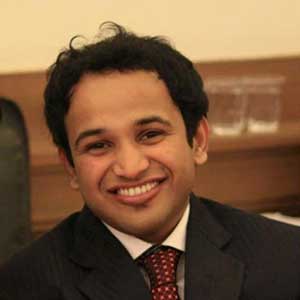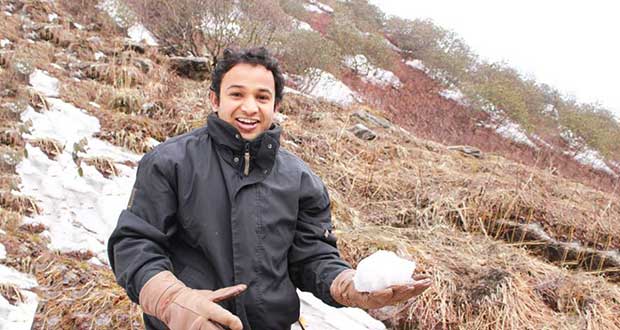Aditya Khandekar is a graduate from National Law Institute University, Bhopal (Batch of 2012). Thereafter, he worked as an in-house counsel at ICICI Bank, Mumbai for two years. His interest in litigation led him to leave his lucrative job and start litigation. He has recently started litigating before Madhya Pradesh High Court (Jabalpur).
In this interview, he talks about:
- Work experience at ICICI Bank
- Choosing litigation over corporate job
Please introduce yourself to our readers. Please tell us a little bit about your childhood and your background?
My name is Aditya Khandekar. As both my parents work are government servants, I spent my childhood living in Bhopal & Delhi and did my 10th and 12th from Sanskriti School, New Delhi. Having grown up in government colonies where there were a large number of kids of my age, I remember spending most evenings playing different sports such as basketball or cricket, therefore making me an outdoor person. I enjoy travelling, reading books and playing games whether on the computer or outside on the field.
How did you gravitate towards law? Why law and not engineering or medical studies?
By the time I passed out of school in 2007, law schools had just started becoming popular. If one sees the curriculum of a 5 year law school one would see that a law graduate studies various subjects such as economics, history, political science and of course the law subjects themselves. I was very keen to study economics but felt that law school might be interesting as there were several other subjects that could be potentially stimulating. However, the real clincher was the fact that a friend of mine recommended that I take a few trial classes at Universal coaching centre for the law admission tests. I attended the class and found it to be quite intriguing and thereafter appeared for the admission tests. I cleared the test for NLIU Bhopal and Amity University which was at that time located in Delhi and then joined NLIU Bhopal.
Despite being a science student, I was never interested in pursuing science after class 12th, I had taken science only with the purpose of keeping my options open. I was fairly certain that engineering was not my cup of tea.
Tell us about your years in law school. What made your journey with NLIU exciting?
Law school was a roller coaster from the very beginning. I was an avid Mooter and Debater and took part in competitions such as the 3 on 3 Asians Debating Competition held at Bangkok, Thailand. I think I took part in almost every competition that took place in college whether it be client counselling, mooting or even dancing for that matter which I am really bad at. I also went for moots to NALSAR, NLU Delhi & GLC, Trivandrum. We won the moot at NALSAR and were the semi-finalists in a moot conducted in New Delhi. I was also involved in organising the 1st NLIU INADR mediation competition which was a great learning experience. I think what made NLIU really exciting, was the many outings that my friends and I had, whether it be to Goa where half my batch ended up going in my final year or the outings to national parks such as Kanha or Bandhavgarh. In the final holidays we criss-crossed the State of Rajasthan and two of my friends actually travelled all the way from Rajasthan to Assam.
 How did you fare in your academics at NLIU? Would you say a great CGPA is a necessity to kickstart a good career in the legal profession?
How did you fare in your academics at NLIU? Would you say a great CGPA is a necessity to kickstart a good career in the legal profession?
I was fairly decent at academics, I ended up getting around 71% at the end of 5 years and was close to the top 10% in my batch. I think a great CGPA is necessary for applying to certain law firms such as AMSS. Other reputed firms give weightage to internships that a student may have done with them. Some places like ICICI recruit purely on the basis of a group discussion and interview. The CGPA does not guarantee a placement in such cases. Overall, I would say that to get a job from campus it is advisable to be in the top 15% of the batch. This would ensure that you get shortlisted for all the institutions visiting campus for interviews. Publications and good internships are also crucial.
What were your areas of interest during your graduation? How did you go about developing expertise and knowledge in these areas?
While I cannot say that I was particularly interested in any one area of law, I ended up doing 2-3 moots on constitutional law in particular dealing with the constitutional validity of certain provisions and therefore my interest gradually grew towards constitutional law. I think a person can develop interest in any field if he/ she spends sufficient time on it.
You have worked at ICICI Bank as a Law Officer for two years. How was the experience?
I had a great time working at ICICI Bank as a law officer. I initially began working in the Project Finance team and worked in that group for about a year and thereafter was shifted to the Structured Finance Group where I worked for about 4 months. Both these teams deal with large scale loans that are given to develop infrastructure. While project finance involves heavy documentation which at times can be very arduous, structured finance is relatively lighter in documentation and the stress is more on structuring/ shaping the deal which generally involves multiple entities and trans-boundary issues. ICICI is a place to work where one can have a good work life balance and at the same time can learn.
Leaving a well paying corporate job must have been decisive. Were you in double minds before starting practice at Madhya Pradesh High Court? Why did you prefer Litigation over your corporate job?
The dilemma is that a corporate job gives a handsome salary while litigation initially is not very rewarding. Since I enjoyed debating and mooting, I was very keen to at least give litigation a try. The idea of landing a corporate job after passing out of law school was that since the corporate job pays well, it would lead to savings which could be used during the first year of litigation where the pay would not be so good. I opted for litigation over my corporate job because every case is unique and poses new challenges. It is far more rewarding when a judge accepts your argument in comparison to say drafting a deed of hypothecation. Plus I was never happy with a desk job and therefore enjoy the running about which is necessary in litigation.
Do you think your experience in mooting, debate, ADR and client counseling competitions shall help you in your litigation career?
Yes, having done public speaking in the past, I have no hesitation while appearing before the Court and that has definitely been a great asset.
What can the law schools do to encourage more people into litigation? Do you think the law school curriculum requires overhaul?
Most law schools have a recruitment cell that mainly focuses on getting firms/ companies to campus for recruitment either at the end of fourth year or in the beginning of 5th year. However, these recruitment cells rarely contact Senior Advocates and Advocates on record for internships or recruitment. Many Lawyers these days have started offering competitive stipends which either match or are close to the retainer ships being offered by corporate firms. At times partners of law firms visit campuses to give lectures and conduct seminars, the same opportunity should also be given to Senior Advocates who I am sure would be able to encourage students to opt for litigation. I don’t think the law school curriculum requires a complete overhaul. What needs to be realized is that unlike engineering, law requires a much more hands on approach and therefore the curriculum needs to be aligned to the industry where both transactional work as well drafting/ litigation needs to be intertwined which can be easily done by giving more emphasis to moots, client counselling, adequate time for internships etc. I genuinely believe that internships and moots teach more than what a law student learns in class.
How is your experience so far? What is your workday like? Are there new challenges every day or did work fall into a predictable pattern?
My experience has been quite interesting so far. An average work day begins at 10 AM and goes on till about 4:30 when the court closes, thereafter there is drafting/ research/ preparation work in office from 8PM to about 10:30 PM. Therefore, the day is fairly long and at times even stretches well beyond midnight. There are new challenges every day, I on an average appear in 4 to 5 matters every day. These are for different public sector undertakings as well as for certain private clients. Each case requires preparation and has its own distinctive challenges.
How necessary is it to have a mentor/guide to advise a young lawyer while still in the formative years of the profession?
The role of a mentor/ guide is vital to a young lawyer. The courts have their own ways of doing things and tend to be very strict on procedure and it takes a while to understand the working as to how the matters are listed, the manner in which the court is addressed, how to pre-empt the questions that a judge may ask and most importantly how to dodge a tricky question/ situation.
What were the difficulties you faced in the early days of your practice? How difficult would you say it is to build a reputed practice? How many years of hard work would it require to build a firm clientele?
We have all seen movies where a court scene is shot and the protagonist addresses the court for several minutes trying to convince the Judge/ jury to accept his/ her argument. In realty however, the situation is very different, in the High Courts as well as the Supreme Court when a matter is listed for admission or for grant of stay/ vacation of stay, the decision whether to admit the matter or grant the stay is generally based on 2-3 quick questions which the Court asks. This process generally takes just one or two minutes. Therefore, the most difficult aspect in early days of practice is acquiring the art of giving the perfect one or two line answer which satisfies the court to grant whatever relief the advocate is praying for. This skill takes time to develop and completely depends upon the opportunity that one gets. I think it takes at least 3-4 years to build a reputed practice and a firm clientele.
Lastly, what would be your parting message for our readers?
Having enjoyed working in a corporate environment as well in litigation, I just want to say that neither one is perfect and every person is required to decide for himself or herself that which career suits them best. I do not wish to advocate for either of the two and believe that a lawyer must experience both and then decide whether it be through internships during college or thereafter.
























